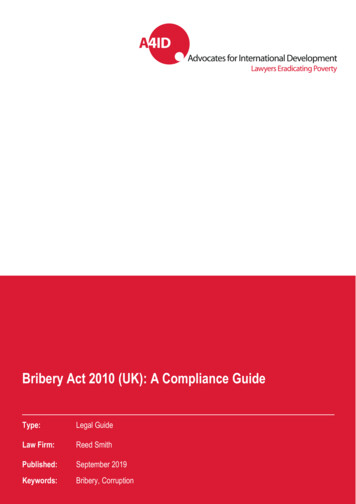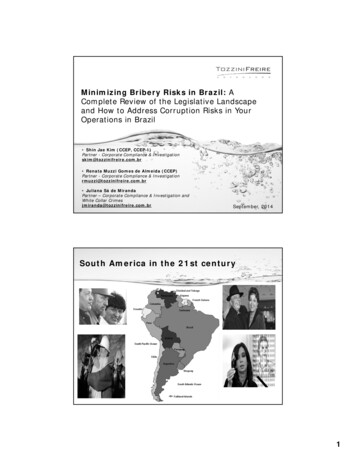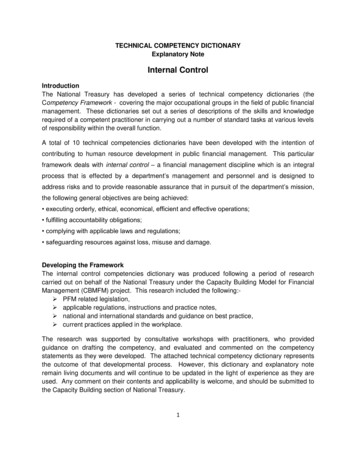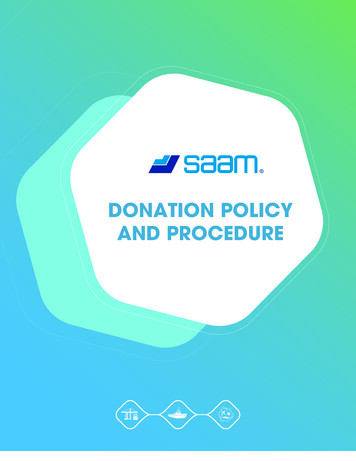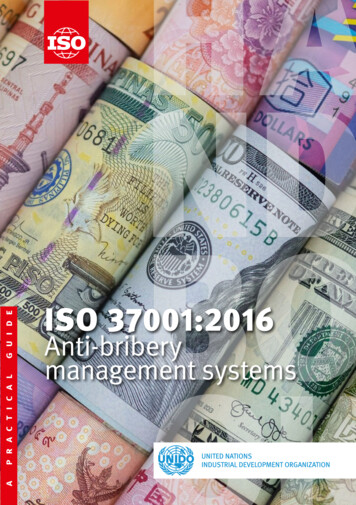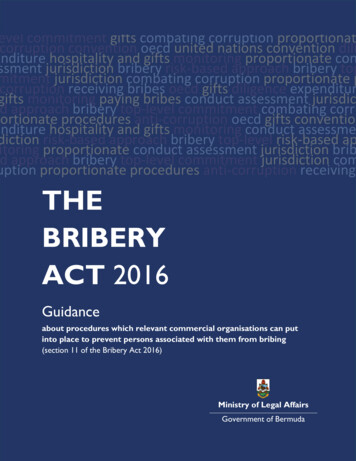
Transcription
evel commitment gifts combating corruption proportionatcorruption convention oecd united nations convention dilienditure hospitality and gifts monitoring proportionate conssment jurisdiction bribery risk-based approach bribery topmitment jurisdiction combating corruption proportionate pcorruption receiving bribes oecd gifts diligence expenditurgifts monitoring paying bribes conduct assessment jurisdicd approach bribery top-level commitment combating corruportionate procedures anti-corruption oecd gifts conventionenditure hospitality and gifts monitoring conduct assessmediction risk-based approach bribery top-level risk-based apitoring proportionate conduct assessment jurisdiction bribd approach bribery top-level commitment jurisdiction comuption proportionate procedures anti-corruption receivingTHEBRIBERYACT 2016Guidanceabout procedures which relevant commercial organisations can putinto place to prevent persons associated with them from bribing(section 11 of the Bribery Act 2016)Ministry of Legal AffairsGovernment of Bermuda
The Bribery Act 2016 – GuidanceMinisterial forewordThe twin scourges of bribery and corruption must be stamped out. In addition to individuals andbusinesses who suffer directly, there is a well-documented, corrosive effect on democracy andthe rule of law. Taxpayers are defrauded, honest businesses suffer from unfair competition and asociety’s economic and social development is undermined. That bribery and corruption aremorally repugnant should be self-evident to any right-thinking member of society.The International Monetary Fund estimates thatpublic sector corruption siphons 1.5 trillion to 2 trillion annually from the global economy inbribes and costs far more in stunted economicgrowth, lost tax revenues and sustained poverty.The indirect costs of corruption are toonumerous to estimate but are thought to includeincreased income inequality, skewed publicinfrastructure investment and decreased socialspending on healthcare and education.partner strategy to maintain the island’s status as aclean and reputable business jurisdiction.The previous law on corruption wasunsatisfactory. The new Act will provide a modernand comprehensive scheme of bribery offences, inorder to allow investigators, prosecutors and thecourts to tackle bribery effectively whethercommitted at home or overseas. The offencescreated will address both sides of the briberyequation, instead of the one-sided approachadopted by current corruption offences, whichfocus only on the recipients of the bribes. The Actwill help to enhance Bermuda’s internationalreputation for the highest ethical standards.Bermuda may be an island; it nonetheless plays afully integrated role in the internationalcommunity.The Bribery Act 2016 represents a major steptowards Bermuda meeting an international goldstandard in the fight against bribery andcorruption. It also paves the way for Bermuda tojoin the international community under theauspices of the United Nations ConventionAgainst Corruption and OECD Anti-BriberyConvention.Enacting legislation, while necessary, is only a firststep. Bermuda as a society must be prepared totake action when and where we see corruption.It requires the Government to protect taxpayersby designing improved public procurementprocedures and by recovering the proceeds ofcrime through the courts. It requires communityleaders to match anti-corruption rhetoric withdeeds and robust support. It requires publicservants and businesses to take timely actionwhen relevant information comes to theirattention. It requires us to overcome a reluctanceIn recent years, much progress has been made tocombat economic crime of all kinds, particularly inthe field of money-laundering and terroristfinancing. This is part of a multi-agency and multi-1
The Bribery Act 2016 – Guidancein the community to deal with these difficultissues.proportionality. It also offers case study examplesthat help illuminate the application of the Act.It is not enough to say that we are againstcorruption. We need to take action – to improvethings going forward, to punish past wrong-doingand to ensure that victims of corruption can seekrecompense through established procedures.Ultimately, the Bribery Act matters for Bermudabecause our existing legislation is out of date. Inupdating our rules, I say to our internationalpartners that Bermuda is ready, willing and able toplay a leading role in stamping out corruption.The Act creates offences of offering or receivingbribes, of bribery of foreign public officials and offailure to prevent a bribe being paid on anorganisation’s behalf. These are certainly toughrules. But readers should understand too that theyare directed at making life difficult for themavericks responsible for corruption, not undulyburdening the vast majority of decent, law-abidingfirms.Hon. Trevor G Moniz, JP, MPAttorney General & Minister of Legal AffairsJune 2017In line with the Bribery Act’s statutoryrequirements, I am publishing this guidance to helporganisations understand the legislation and dealwith the risks of bribery. My aim is that it offersclarity on how the law will operate.I have also listened carefully to stakeholderrepresentations to ensure the Act is implementedin a workable way – especially for small firms thathave limited resources. And, as I hope thisguidance shows, combating the risks of bribery islargely about common sense, not burdensomeprocedures. The core principle it sets out is2
The Bribery Act 2016 – GuidanceContentsMinisterial foreword . 1Introduction . 5Government policy and Section 9 of the Bribery Act . 7Jurisdiction . 8Sections 3: Offence of bribing someone . 9Section 8: Bribery of a foreign public official . 10Local law. 11Hospitality, promotional, and other business expenditure . 11Section 9: Failure of commercial organisations to prevent bribery . 13Commercial organisation . 13Associated person . 13Facilitation payments . 15Additional defences . 16What commercial organizations are expected at a minimum to do . 17The six principles . 19Principle 1 - Proportionate procedures . 20Commentary . 20Procedures . 21Principle 2 - Top-level commitment . 23Commentary . 23Procedures . 23Principle 3 - Risk Assessment . 26Commentary . 26Procedures . 26Commonly encountered risks . 27Principle 4 - Due diligence . 29Commentary . 29Procedures . 29Principle 5 - Communication (including training) . 31Commentary . 31Procedures . 313
The Bribery Act 2016 – GuidancePrinciple 6 - Monitoring and review . 33Commentary . 33Procedures . 33Appendix - Bribery Act 2016 case studies . 34Introduction . 34Case study 1 – Principle 1: Facilitation payments . 35Case study 2 – Principle 1: Proportionate Procedures . 36Case study 3 – Principles 1 and 6: Joint venture. 37Case study 4 – Principles 1 and 5: Hospitality and Promotional expenditure . 38Case study 5 – Principle 3: Assessing risks . 40Case study 6 – Principle 4: Due diligence of agents . 41Case study 7 – Principle 5: Communicating and training. 42Case study 8 – Principle 1, 4 and 6: Community benefits and charitable donations . 43Case study 9 – Principle 4: Due diligence of agents . 44Case study 10 – Principle 2: Top level commitment . 45Case study 11 – Proportionate procedures . 464
The Bribery Act 2016 – GuidanceIntroduction1.The Bribery Act 2016 (“the Act”) received the Assent of the Governor on 6 December 2016and comes into effect on 1 September 2017. A copy of the Act can be accessed atwww.bermudalaws.bm.2.The Act has modernized Bermuda’s anti-corruption laws by introducing a new, simplified andcomprehensive regime prohibiting bribery. The Act was also drafted and enacted as a significantstep towards extending to Bermuda the United Nations Convention Against Corruption(“UNCAC”) and the OECD Convention on Combating Bribery of Foreign Public Officials inInternational Business Transactions (“Bribery Convention”).3.By way of overview, new general offences of bribery, based on the UK’s Bribery Act 2010, havereplaced previous offences relating to bribery and corruption. Additionally, the Act imposes aduty on public officials to report an offer of a bribe, or circumstances relating to collusion in theawarding of contracts. There are corresponding offences of failing to comply with that duty, orinterfering with that duty. These provisions derive from the Isle of Man’s Bribery Act 2013.4.The Bill also establishes the National Anti-Corruption and Bribery Committee to advise theMinister regarding the effectiveness of legislation and policy in accordance with therequirements of Article 6 of the UNCAC, which provides for the establishment of a body tooversee, co-ordinate and review the implementation of anti-corruption procedures and policies.5.The Act creates a new offence under section 9 which can be committed by commercialorganisations that fail to prevent persons associated with them from committing bribery ontheir behalf. It is a defence for an organisation to prove that despite a particular case of briberyit nevertheless had adequate procedures in place to prevent persons associated with it frombribing. Section 11 of the Act requires the Minister of Legal Affairs to publish guidance aboutprocedures which commercial organisations can put in place to prevent persons associated withthem from bribing.6.Section 11(3) of the Act states that in determining whether a relevant commercial organisationhas committed an offence under section 9 a court shall consider whether the organisationfollowed this guidance.7.The statutory guidance explains the policy behind section 9 and is intended to help commercialorganisations of all sizes and sectors understand what sorts of procedures they can put in placeto prevent bribery as mentioned in section 9(1).8.The statutory guidance is designed to be of general application and is formulated around sixguiding principles, each followed by commentary and examples. The guidance is not prescriptiveand is not a one-size-fits-all document. The question of whether an organisation had adequateprocedures in place to prevent bribery in the context of a particular prosecution is a matter thatcan only be resolved by the courts taking into account the particular facts and circumstances ofthe case. The onus will remain on the organisation, in any case where it seeks to rely on the5
The Bribery Act 2016 – Guidancedefence, to prove that it had adequate procedures in place to prevent bribery. However,departures from the suggested procedures contained within the guidance will not of itself giverise to a presumption that an organisation does not have adequate procedures.9.If an organisation is small or medium sized the application of the principles is likely to suggestprocedures that are different from those that may be right for a large multinational organisation.The guidance suggests certain procedures, but they may not all be applicable in thesecircumstances. Sometimes, you may have alternatives in place that are also adequate.10.As the principles make clear commercial organisations should adopt a risk-based approach tomanaging bribery risks. Procedures should be proportionate to the risks faced by anorganisation. No policies or procedures are capable of detecting and preventing all bribery. Arisk-based approach will, however, serve to focus the effort where it is needed and will havemost impact. A risk-based approach recognises that the bribery threat to organisations variesacross jurisdictions, business sectors, business partners and transactions.11.The language used in this guidance reflects its non-prescriptive nature. The six principles in PartII are intended to be of general application. The commentary following each of the principles isexpressed more broadly.12.All terms used in this guidance have the same meaning as in the Act. Any examples of particulartypes of conduct are provided for illustrative purposes only and do not constitute exhaustivelists of relevant conduct.13.Readers should note that this document only constitutes guidance. The Act is paramount, andwill ultimately be construed and interpreted by the courts. In the event of any conflict betweenthis document and the Act, the latter will prevail.6
The Bribery Act 2016 – GuidanceGovernment policy and Section 9 of the Bribery Act14.Bribery undermines democracy and the rule of law and poses very serious threats to sustainedeconomic progress in developing and emerging economies and to the proper operation of freemarkets more generally. The Bribery Act 2016 is intended to respond to these threats and tothe extremely broad range of ways that bribery can be committed. It does this by providingrobust offences, enhanced sentencing powers for the courts and wide jurisdictional powers.15.The Act contains two general offences covering the offering, promising or giving of a bribe(active bribery) and the requesting, agreeing to receive or accepting of a bribe (passive bribery)at sections 3 and 4 respectively. It also sets out two further offences which specifically addresscommercial bribery. Section 8 of the Act creates an offence relating to bribery of a foreignpublic official in order to obtain or retain business or an advantage in the conduct of business 1,and section 9 creates a new form of corporate liability for failing to prevent bribery on behalf ofa commercial organisation. More detail about the sections 3, 8 and 9 offences is provided underthe separate headings below.16.The objective of the Act is not to bring the full force of the criminal law to bear upon well runcommercial organisations that experience an isolated incident of bribery on their behalf. So inorder to achieve an appropriate balance, section 9 provides a defence. This is in recognition ofthe fact that no bribery prevention regime will be capable of preventing bribery at all times.However, the defence is also included in order to encourage commercial organisations to putprocedures in place to prevent bribery by persons associated with them.17.The application of bribery prevention procedures by commercial organisations is of significantinterest to those investigating bribery and is relevant if an organisation wishes to report anincident of bribery to the authorities.18.Liability arises under section 9 of the Act if a person associated with a commercial organizationbribes someone (amounting to an offence under sections 3 or 8, whether or not the associate isconvicted), and the organization does not have adequate procedures aimed at preventingbribery. Where the prosecution cannot prove beyond reasonable doubt that a section 3 or 8offence has been committed, the section 9 offence will not be triggered.19.The section 9 offence is in addition to, and does not displace, liability which might arise undersections 3 or 8 of the Act where the commercial organisation itself commits an offence byvirtue of the common law ‘identification’ principle.21Conduct amounting to bribery of a foreign public official could also be charged under section 3 of the Act. It willbe for prosecutors to select the most appropriate charge.2See section 7(1) of the Interpretation Act 1951 which provides that the word ‘person’ where used in an Actincludes bodies corporate and unincorporate. Note also the common law ‘identification principle’ as defined bycases such as Tesco Supermarkets v Nattrass [1972] AC 153 which provides that corporate liability arises onlywhere the offence is committed by a natural person who is the directing mind or will of the organisation.7
The Bribery Act 2016 – GuidanceJurisdiction320.Section 18 of the Act provides that the courts will have jurisdiction over the sections 3, 43 or 8offences committed in Bermuda, but they will also have jurisdiction over offences committedoutside Bermuda where the person committing them has a close connection with Bermuda byvirtue of being a British national or ordinarily resident in Bermuda, a body incorporated inBermuda.21.However, as regards section 9, the requirement of a close connection with Bermuda does notapply. Section 9(3) makes clear that a commercial organisation can be liable for conductamounting to a section 3 or 8 offence on the part of a person who is neither a Bermuda nationalor resident in Bermuda, nor a body incorporated or formed in Bermuda. In addition, section18(5) provides that an offence irrespective of whether the acts or omissions which form part ofthe section 9 offence take part in Bermuda or elsewhere. If the organisation is incorporated orformed in Bermuda, or it carries on a business or part of a business in Bermuda (wherever inthe world it may be incorporated or formed), Bermuda courts will have jurisdiction.Although this particular offence is not relevant for the purposes of section 9.8
The Bribery Act 2016 – GuidanceSections 3: Offence of bribing someone22.Section 3 makes it an offence for a person (‘P’) to offer, promise or give a financial or otheradvantage to another person in one of two cases:a. Case 1 applies where P intends the advantage to bring about the improperperformance by another person of a relevant function or activity or to reward suchimproper performance.b. Case 2 applies where P knows or believes that the acceptance of the advantage offered,promised or given in itself constitutes the improper performance of a relevant functionor activity.23.‘Improper performance’ is defined in sections 5, 6 and 7. In summary, this means performancewhich amounts to a breach of an expectation that a person will act in good faith, impartially, orin accordance with a position of trust. The offence applies to bribery relating to any function ofa public nature, connected with a business, performed in the course of a person’s employmentor performed on behalf of a company or another body of persons. Therefore, bribery in boththe public and private sectors is covered.24.For the purposes of deciding whether a function or activity has been performed improperly thetest of what is expected is a test of what a reasonable person in Bermuda would expect inrelation to the performance of that function or activity. Where the performance of the functionor activity is not subject to Bermuda law (for example, it takes place in a country other thanBermuda) then any local custom or practice must be disregarded – unless permitted or requiredby the written law applicable to that particular country. Written law means any writtenconstitution, provision made by or under legislation applicable to the country concerned or anyjudicial decision evidenced in published written sources.25.By way of illustration, in order to proceed with a case under section 3 based on an allegationthat hospitality was intended as a bribe, the prosecution would need to show that the hospitalitywas intended to induce conduct that amounts to a breach of an expectation that a person willact in good faith, impartially, or in accordance with a position of trust. This would be judged bywhat a reasonable person in Bermuda thought. So, for example, an invitation to foreign clientsto attend the Annual Cup Match Classic as part of a public relations exercise designed tocement good relations or enhance knowledge in the organisation’s field is unlikely to engagesection 3 unless there is evidence of an intention to induce improper performance of a relevantfunction.9
The Bribery Act 2016 – GuidanceSection 8: Bribery of a foreign public official26.Section 8 creates a new offence of bribery of a foreign public official. The offence is committedwhere a person offers, promises or gives a financial or other advantage to a foreign public officialwith the intention of influencing the official in the performance of his or her official functions.The person offering, promising or giving the advantage must also intend to obtain or retainbusiness or an advantage in the conduct of business by doing so. However, the offence is notcommitted where the official is permitted or required by the applicable written law to beinfluenced by the advantage.27.A ‘foreign public official’ includes officials, whether elected or appointed, who hold a legislative,administrative or judicial position of any kind of a country or territory outside Bermuda. It alsoincludes any person who performs public functions in any branch of the national, local ormunicipal government of such a country or territory or who exercises a public function for anypublic agency or public enterprise of such a country or territory, such as professionals workingfor public health agencies and officers exercising public functions in state-owned enterprises.Foreign public officials can also be an official or agent of a public international organisation, suchas the UN, CARICOM, the EU or the World Bank.28.Sections 3 and 8 may capture the same conduct but will do so in different ways. The policy thatfounds the offence at section 8 is the need to prohibit the influencing of decision making in thecontext of publicly funded business opportunities by the inducement of personal enrichment offoreign public officials or to others at the official’s request, assent or acquiescence. Such activityis very likely to involve conduct which amounts to ‘improper performance’ of a relevant functionor activity to which section 3 applies, but, unlike section 3, section 8 does not require proof of itor an intention to induce it. This is because the exact nature of the functions of personsregarded as foreign public officials is often very difficult to ascertain with any accuracy, and thesecuring of evidence will often be reliant on the co-operation of the state any such officialsserve. To require the prosecution to rely entirely on section 3 would amount to a verysignificant deficiency in the ability of the legislation to address this particular mischief. That said,it is not the Government’s intention to criminalise behaviour where no such mischief occurs,but merely to formulate the offence to take account of the evidential difficulties referred toabove. In view of its wide scope, and its role in the new form of corporate liability at section 9,the Government offers the following further explanation of issues arising from the formulationof section 8.10
The Bribery Act 2016 – GuidanceLocal law29.For the purposes of section 8 prosecutors will be required to show not only that an ‘advantage’was offered, promised or given to the official or to another person at the official’s request,assent or acquiescence, but that the advantage was one that the official was not permitted orrequired to be influenced by as determined by the written law applicable to the foreign official.30.In seeking tenders for publicly funded contracts Governments often permit or require thosetendering for the contract to offer, in addition to the principal tender, some kind of additionalinvestment in the local economy or benefit to the local community. Such arrangements could incertain circumstances amount to a financial or other ‘advantage’ to a public official or to anotherperson at the official’s request, assent or acquiescence. Where, however, relevant ‘written law’permits or requires the official to be influenced by such arrangements they will fall outside thescope of the offence. So, for example, where local planning law permits community investmentor requires a foreign public official to minimise the cost of public procurement administrationthrough cost sharing with contractors, a prospective contractor’s offer of free training is veryunlikely to engage section 8. In circumstances where the additional investment would amount toan advantage to a foreign public official and the local law is silent as to whether the official ispermitted or required to be influenced by it, prosecutors will consider the public interest inprosecuting. This will provide an appropriate backstop in circumstances where the evidencesuggests that the offer of additional investment is a legitimate part of a tender exercise.Hospitality, promotional, and other business expenditure31.Bona fide hospitality and promotional, or other business expenditure which seeks to improvethe image of a commercial organisation, better to present products and services, or establishcordial relations, is recognised as an established and important part of doing business and it isnot the intention of the Act to criminalise such behaviour. The Government does not intend forthe Act to prohibit reasonable and proportionate hospitality and promotional or other similarbusiness expenditure intended for these purposes. It is, however, clear that hospitality andpromotional or other similar business expenditure can be employed as bribes.32.In order to amount to a bribe under section 8 there must be an intention for a financial orother advantage to influence the official in his or her official role and thereby secure business ora business advantage. In this regard, it may be in some circumsta
The Bribery Act 2016 - Guidance 5 Introduction 1. The Bribery Act 2016 ("the Act") received the Assent of the Governor on 6 December 2016 and comes into effect on 1 September 2017. A copy of the Act can be accessed at www.bermudalaws.bm. 2. The Act has modernized Bermuda's anti-corruption laws by introducing a new, simplified and



